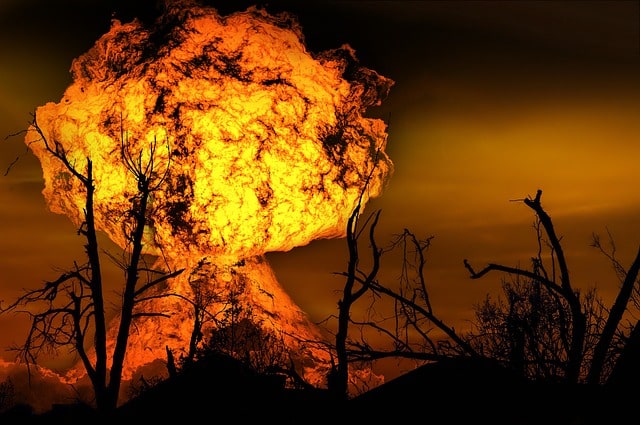
The noise of an explosion can be considered a crash
The term din comes from the Latin word strepĭtus . The concept refers to a significant noise , of high intensity.
A shocking noise
Noise , on the other hand, is a sound that lacks articulation and is usually unpleasant . In the case of clatter, said sound is very loud and tends to shock or startle those who hear it.
When an explosion occurs, for example, a crash is generated. The burst releases sound energy (which carries sound waves). For example: “The crash caused by the detonation of the bomb was heard for several kilometers around” , “There was a gas leak in the cultural center that caused an explosion, the crash of which shocked the neighbors” , “In my nightmares I still hear the crashes of the missiles exploding…”
Large impacts also cause a crash: “The collision of the two railway formations produced a deafening crash,” “The demolition of the structure will cause a crash that will surely scare the animals that live in the area,” “When you hear the crash, I assumed that the shelf full of bottles had fallen.”
The noise is "heard"
In this context, as well as in that of any other concept that describes a sound or noise, it is important to remember the differences between the two most used verbs to designate the functions of our auditory system : hear and listen . Although we often find the second used in both senses, they have very different and complementary meanings.
The verb hear is defined as "perceive sounds with the ear." Although in everyday speech it is not always used strictly in this sense, hearing is something that happens involuntarily : we cannot force it, but we can avoid it. In other words, we hear because our sense works, whether we want to or not; our only way to control it is to cover our ears to isolate outside sound.
On the other hand, comes the verb listen , which means "to pay attention to what is heard." In other words, this is the verb that is done with intention ; For example: if I want to know what they are talking about in another room and naturally I can't hear the conversation, I go to the door to listen to it. Of course, as explained in the definition of the term, if I listen it is because I can hear .
In the case of a crash, since it is a noise that usually takes us by surprise, in most cases the correct verb to describe our perception of it is hear . It would be different to intentionally listen to the recording of an explosion to analyze it: in that case, both verbs can even be combined: "I have heard the crash several times, but I don't hear anything that tells me its causes."

The noise usually takes us by surprise.
figuratively
It is also known as noise to the pomp , the sumptuousness , the display or the apparatus with which an action is carried out or something is specified: “He entered the room with a noise with the aim of making everyone notice his presence” , “The waiter "He slipped and ended up on the floor with a crash," "Exaggerating his cordiality, the actor greeted the press workers who were waiting for him at the exit of the theater with a crash."
Just as in its strictest sense, the term clatter describes a noise that is impossible to ignore, this sense of "ostentatiousness" should also be understood as an effort to get others to pay attention to us without exception.
The RAE presents us with the following adverbial phrase used in the field of law: without noise or figure of judgment . Its meaning is to proceed briefly in certain businesses, without attending to all the formalities of a trial .
